
Filter News
Area of Research
- Biology and Environment (23)
- Biology and Soft Matter (1)
- Clean Energy (36)
- Computational Engineering (1)
- Electricity and Smart Grid (1)
- Functional Materials for Energy (1)
- Fusion and Fission (2)
- Materials (11)
- Materials for Computing (1)
- Mathematics (1)
- National Security (2)
- Neutron Science (3)
- Nuclear Science and Technology (5)
- Supercomputing (7)
- Transportation Systems (1)
News Topics
- (-) Decarbonization (80)
- (-) Mathematics (8)
- (-) Molten Salt (8)
- 3-D Printing/Advanced Manufacturing (122)
- Advanced Reactors (34)
- Artificial Intelligence (91)
- Big Data (55)
- Bioenergy (92)
- Biology (99)
- Biomedical (58)
- Biotechnology (22)
- Buildings (57)
- Chemical Sciences (65)
- Clean Water (29)
- Climate Change (100)
- Composites (26)
- Computer Science (189)
- Coronavirus (46)
- Critical Materials (26)
- Cybersecurity (35)
- Education (4)
- Element Discovery (1)
- Emergency (2)
- Energy Storage (109)
- Environment (195)
- Exascale Computing (37)
- Fossil Energy (6)
- Frontier (42)
- Fusion (55)
- Grid (63)
- High-Performance Computing (85)
- Hydropower (11)
- Irradiation (3)
- Isotopes (53)
- ITER (7)
- Machine Learning (48)
- Materials (144)
- Materials Science (141)
- Mercury (12)
- Microelectronics (3)
- Microscopy (51)
- Nanotechnology (60)
- National Security (62)
- Net Zero (14)
- Neutron Science (131)
- Nuclear Energy (109)
- Partnerships (44)
- Physics (61)
- Polymers (33)
- Quantum Computing (34)
- Quantum Science (69)
- Renewable Energy (2)
- Security (24)
- Simulation (48)
- Software (1)
- Space Exploration (25)
- Statistics (3)
- Summit (57)
- Sustainable Energy (126)
- Transformational Challenge Reactor (7)
- Transportation (97)
Media Contacts

A modeling analysis led by ORNL gives the first detailed look at how geothermal energy can relieve the electric power system and reduce carbon emissions if widely implemented across the United States within the next few decades.

ORNL researchers have developed a novel way to encapsulate salt hydrate phase-change materials within polymer fibers through a coaxial pulling process. The discovery could lead to the widespread use of the low-carbon materials as a source of insulation for a building’s envelope.
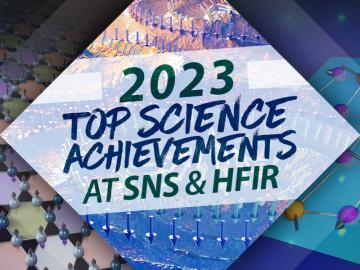
The 2023 top science achievements from HFIR and SNS feature a broad range of materials research published in high impact journals such as Nature and Advanced Materials.

Scientists from more than a dozen institutions have completed a first-of-its-kind high-resolution assessment of carbon dioxide removal potential in the United States, charting a path to achieve a net-zero greenhouse gas economy by 2050.
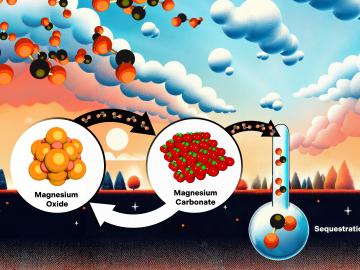
Magnesium oxide is a promising material for capturing carbon dioxide directly from the atmosphere and injecting it deep underground to limit the effects of climate change. ORNL scientists are exploring ways to overcome an obstacle to making the technology economical.
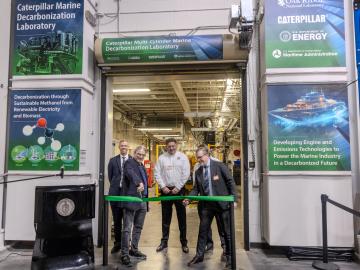
ORNL and Caterpillar Inc. have entered into a cooperative research and development agreement, or CRADA, to investigate using methanol as an alternative fuel source for four-stroke internal combustion marine engines.
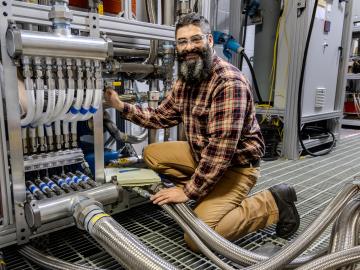
Within the Department of Energy’s National Transportation Research Center at ORNL’s Hardin Valley Campus, scientists investigate engines designed to help the U.S. pivot to a clean mobility future.
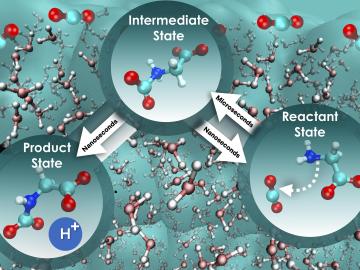
Recent research by ORNL scientists focused on the foundational steps of carbon dioxide sequestration using aqueous glycine, an amino acid known for its absorbent qualities.

ORNL's Climate Change Science Institute and the Georgia Institute of Technology hosted a Southeast Decarbonization Workshop in November that drew scientists and representatives from government, industry, non-profits and other organizations to

Scientists at ORNL used their knowledge of complex ecosystem processes, energy systems, human dynamics, computational science and Earth-scale modeling to inform the nation’s latest National Climate Assessment, which draws attention to vulnerabilities and resilience opportunities in every region of the country.


